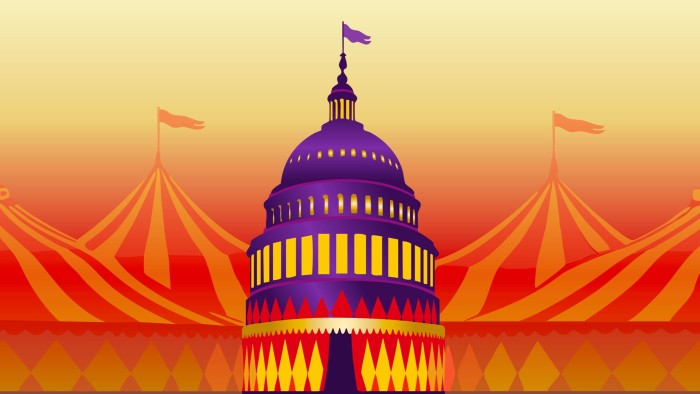Unlock the White House Watch newsletter for free
Your guide to what the 2024 US election means for Washington and the world
Two millennia ago, the Roman poet Decimus Junius Juvenalis (“Juvenal”) decried the political phenomenon of “bread and circuses”.
Back in AD100, the Roman empire was crushed by so much debt and income inequality (sound familiar?) that its emperors tried to placate a restive public with free “bread” (ie short-term bribes) and gladiatorial contests or “circuses”. The idea was to distract them — while ignoring the need for structural reform. Is this happening again?
Two months ago, it seemed so. Washington’s recent leaders, like the Roman emperors, have also been negligent about tackling structural problems, such as America’s $36tn debt. And Donald Trump campaigned to become the 47th president — or modern-day emperor — on a “bread and circuses” platform.
Most notably, he promised to cut taxes, smash inflation and create new jobs, all while delivering endlessly distracting entertainment. And, as Naomi Klein has noted, his performative political style seems to be borrowed from the World Wrestling Entertainment network he was once involved with — a 21st-century gladiatorial arena.
But today’s tariff fights are turning that “bread and circuses” platform into something more akin to “jam tomorrow”. Yes, the White House is still offering distracting drama, along with gifts for voters: a package of tax cuts, putative $5,000 “Doge dividend checks”, and this week’s pledge to revive the coal sector, which matters to Trump’s base.
What is more striking, however, is that the White House is also now inflicting pain, in the name of Trump’s self-styled “economic revolution”. His team insists that using tariffs to reorientate the American economy towards greater self-sufficiency and re-industrialisation will produce an economic nirvana in the long term — and is sticking to this line, even amid market turmoil, and Wednesday’s “pause” on most tariffs for 90 days.
But the White House has also acknowledged the obvious: with average tariffs at 27 per cent, the highest level since 1903, according to Yale budget lab, this will produce (at least) short-term shocks. And Trump’s advisers seem to be telling Wall Street to simply suck this up; Treasury secretary Scott Bessent told bankers this week that “for the next four years, the Trump agenda is focused on Main Street”. Hence why the initial $6tn loss on US stocks did not immediately prompt the White House to change its policy on tariffs; instead it only shifted after 10-year bond yields soared to 4.5 per cent (a level that seems akin to a “put”, ie which Bessent does not want to breach).
And as the US-China trade war deepens — even as other tariffs are “paused” — JD Vance, the vice-president, has also acknowledged that Main Street will be hit too; he insists that the country must wean itself off the “drug” of China’s “cheap labour” — even if this reduces US consumers’ access to cheap goods, or sparks recession.
Thus tariffs have presented voters and financiers alike with a “bait and switch”. Last year Trump pledged to make the American economy “great again.” But now he is now telling them they must accept “transitional” – short-term – pain for long-term gain. This is both unexpected and profoundly ironic, given that Trump’s populist record.
So will Americans embrace this? Many of Trump’s critics assume — or hope — not, and predict a Maga revolt when the full economic pain of the trade war with China hits, that will force Trump to change course.
They might be right. American culture is notably different from a place like Japan. The latter has extensive pain-sharing mechanisms and social cohesion, since concepts such as shared sacrifice are ingrained in society. In America it is generally assumed that telling voters to accept pain is the path towards political suicide; sacrifice is unfashionable.
But it does not seem that a full-blooded Maga revolt is happening; or not yet. Yes, more Republicans are expressing alarm. But an average of the 10 most recent polls compiled by Newsweek shows that while Trump’s approval rating has declined from the 49 per cent level seen in early March, it still stands at 47 per cent — hardly a disaster.
That might be down to a time lag effect – and could change if recession hits, as groups such as JPMorgan are warning. Or it might reflect the fact that many Maga supporters live in communities that have already been destroyed by deindustrialisation, and thus more willing to smash the status quo. What elites often forget is that not everyone on Main Street minds crashing markets; 39 per cent of Americans do not own stocks.
Either way, the key point is that Trump’s tariff wars are not just unleashing economic experiments, but a fascinating cultural one, too: what is the American public’s attitude to pain? Will adversity be shared? And the longer that the US-China trade war grinds on, the more the stakes in these experiments will rise. No wonder markets are gyrating.
gillian.tett@ft.com


